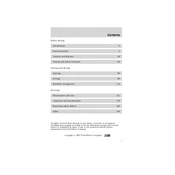Lincoln Town Car 1998 Owner's Manual


To reset the 'Check Engine' light, you can disconnect the negative battery cable for about 15 minutes. Reconnect it to see if the light has reset. If it persists, a diagnostic scan tool may be required to address underlying issues.
The 1998 Lincoln Town Car typically requires 5W-30 motor oil. The engine oil capacity is approximately 5 quarts with a filter change.
The 1998 Lincoln Town Car does not have a replaceable cabin air filter. It uses a fixed filter screen instead. Ensure the air intake areas are clean to maintain air quality.
Check for leaks in the air suspension system, listen for the compressor running, and inspect the air suspension relay. If problems persist, consult a professional mechanic as air suspension components can be complex.
This could be due to a faulty thermostat, low coolant levels, or a malfunctioning heater core. Check coolant levels and ensure the thermostat is operating correctly. A clogged heater core may need professional cleaning or replacement.
Maintain proper tire pressure, perform regular engine tune-ups, ensure clean air filters, and use recommended fuel grades. Avoid excessive idling and aggressive driving to maximize fuel efficiency.
To change the spark plugs, disconnect the battery, remove the plug wires, unscrew the old spark plugs, and replace them with new ones. Ensure correct gap settings according to the vehicle's specifications. Reattach the wires and battery connection.
Potential causes include low coolant levels, a malfunctioning thermostat, a failing water pump, or a blocked radiator. Check coolant and inspect for leaks or blockages. Replacing the thermostat or water pump may be necessary if issues persist.
Start by checking the battery and fuses. Look for loose or corroded connections. Use a multimeter to test for continuity in wires. If the issue is complex, a professional diagnostic may be required to pinpoint specific electrical faults.
Common issues include slipping gears, delayed shifting, and transmission fluid leaks. Regularly check and maintain fluid levels, and consider a fluid change if needed. Persistent issues may require a professional inspection and possible transmission repair or rebuild.